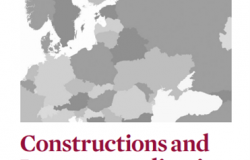Book Review - Constructions and Instrumentalizations of the Past: A Comparative Study of Memory Management in the Region

Constructions and Instrumentalizations of the Past: A Comparative Study of Memory Management in the Region edited by Ninna Mörner. CBEES State of the Region Report. Stockholm: Centre for Baltic and Eastern European Studies, Södertörn University 2020. 186 pp., 978-91-85139-12-5
Anyone interested in Eastern and Central Europe may want to take a closer look at ‘Constructions and Instrumentalizations of the Past’, a publication covering the politics of history in this ‘region of memory’. To tackle this topic, the Centre for Baltic and East European Studies (CBEES) at Södertörn University has put together a volume with two introductions, five essays, ten country reports, and an incisive summary, from a total of twenty authors, mixing international, local, and multidisciplinary expertise.
 The report ‘reveals disturbing tendencies to control and politicize the past in several countries of the region’, Ulla Manns and Joakim Ekman note in the preface. In the introduction, David Gaunt and Tora Lane highlight that the past is not just for historians, schoolbooks, and statues. It now involves ‘the creation of historical commissions and institutions, legislating politicized interpretations of historical events, establishing new museums of national trauma, even getting into international conflicts over interpretations of history.’
The report ‘reveals disturbing tendencies to control and politicize the past in several countries of the region’, Ulla Manns and Joakim Ekman note in the preface. In the introduction, David Gaunt and Tora Lane highlight that the past is not just for historians, schoolbooks, and statues. It now involves ‘the creation of historical commissions and institutions, legislating politicized interpretations of historical events, establishing new museums of national trauma, even getting into international conflicts over interpretations of history.’
Gaunt and Lane situate this development in a broader context, citing historians such as Pieter Geyl, Herbert Butterfield, and Charles S. Maier. They suggest that with the end of grand narratives, history becomes a foundational and a ‘quasi-religious standpoint that can tolerate no doubt.’ The fading of the promise of an easy transition to liberal and prosperous democracy, recently described by Stephen Holmes and Ivan Krastev in The Light that Failed (2017), perhaps adds to that reorientation from the future to the past.
Why such a wide sweep for looking at memory management? As Barbara Törnquist-Plewa argues, the people in Eastern and Central Europe share a past that has entangled their memories, and much of their experience can be ‘characterized as post-colonial, post-catastrophic, post-socialist.’
Against this backdrop, a good part of political identity is being built on suffering, says Florence Fröhlig, in which ‘victimhood becomes the new dominant narrative’ and ‘unappeased pasts continue to haunt the citizenry.’ Thomas de Waal shows how toxic memory politics can inhibit real dialogue across the Caucasus, as ‘events acquire such a significance that it is almost impossible to discuss them in public as a political or historical event’, with specific reference to the killings of 9 April 1989 in Georgia, and Sumgait and Khojali for Armenia and Azerbaijan. On Belarus, Andrej Kotljarchuk outlines how that nation has come to be divided by colors: white-red-white versus red-green, representing two flags with legacies in collision.
In an excellent essay on Poland, Ukraine, and Lithuania, Per Anders Rudling shows how some memory institutions reproduce trauma, rather than transcending it. The analysis applies far beyond these three countries. Rudling also traces how political the concept of genocide is. When the genocide convention was negotiated, Stalin’s diplomats saw to it that killings of entire classes of people would not be considered a genocide. For that reason, too, while all genocides are a deep rupture, not all traumas are a genocide. Rudling draws attention to initiatives such as Historians Without Borders, and makes a convincing argument against attempts to legislate history through memory laws and against ‘government opinion making agencies in the field of history.’
What makes the report particularly compelling is the range of perspectives. Jenny Wüstenberg walks readers through the institutional and financial arrangements of Germany's ‘decentralized landscape of remembrance’. The German federal state is only ‘one among many actors’ and the principle of ‘remoteness from the state’ gives significant autonomy to memorial institutions. Her analysis does highlight that memory management, as stability in many other policy domains, seems to require solid institutions at all levels and an engaged civil society, who achieve ‘an in-depth but also pluralistic confrontation with history.’
Irina Sandomirskaja covers how the visual culture of communism itself has become contested, and considers, among others, the HBO series of Chernobyl, as well as the controversy around Ilya Khrzhanovski’s Dau, a fusion of cinema, experimentation, performance and spirituality.
The country-specific summaries serve as a superb overview on core controversies across this region of memory. Issues covered include, but are not limited to: two state memory institutions in Lithuania, yet at least accessible archives and Violeta Davoliūtė hopes that ‘continuous, albeit not always easy, debate will help Lithuanians fill in the blank spots of this still painful and complicated historical legacy’; lustration in the Czech Republic (Muriel Blaive); the Jedwabne Debate in Poland (Joanne Beata Michlic); the Babyn Jar Holocaust Memorial Center in Ukraine (Yuliya Yurchuk); the House of Terror in Hungary established by, among others, an associate of Viktor Orbán (János M. Rainer); the absence of any such museums in Bulgaria; the limits of reckoning with the Securitate’s abuses through transitional justice in Romania (Lavinia Stan); attempts by various Turkish groups to challenge the state’s preferred narrative, showing contours of commemoration in Turkey that often are not seen from abroad (Talin Suciyan); and the isolation of historians in Belarus (Aliaksei Lastouski).
Many essays are captivating. Evelina Kelbecheva, for example, describes her own decades-long struggles in Bulgaria to get history textbooks revised, combining this with survey data showing widespread ignorance of the past and adds a close reading of how key events are portrayed with insufficient attention to communist political terror.
The report is very well edited, mainly by Ninna Mörner, which likely was a mammoth task. The language is crisp, and the contributions are concise. Even where I was not entirely sold on an analysis or ran into a judgement that struck me as a tad harsh (some of the authors have been activists), I found the papers informative and well-resourced with detailed footnotes. Good photos and professional lay-out make the report visually attractive. The essays are well grounded, with references running from Siegmund Freud to Zygmunt Baumann, Ernest Gellner to Paul Ricoeur, Jelena Subotić to Ron Suny.
Reading the various analyses, it appears that a more comprehensive framework of a kind of Ethics of Political Commemoration could help to order many of the debates. If this framework were to draw on the Just War tradition, for example, it could include principles such as ‘Right Intention’ and ‘Legitimate Authority’ to extend a structured scrutiny to practices that so often seem to go awry. Perhaps such an approach can be explored in the future.
There is more to cover, such as the flagship puzzle of the Stalin Museum in Gori in Georgia. This leaves significant material for future reports. Though not post-socialist, Ireland might be a good addition for consideration, since its divisive past continues to present challenges, while its different trajectory requires a refreshment of categories.
Few people in the field seem to be aware of this landmark publication, and it does not have a dedicated online presentation. This is regrettable for a piece that does more than any other publication that I have seen to present a panoramic perspective on how the past continues to influence the future in Eastern and Central Europe. At the same time, this wonderful collection is free to download, and earlier in the year CBEES even sent copies to people who expressed interest. Not to be missed.
Hans Gutbrod is an Associate Professor at Ilia State University in Tbilisi, Georgia, and a Senior Fellow at the Center for Peace and Conflict Studies at Seton Hall University. He is on Twitter at @HansGutbrod.


